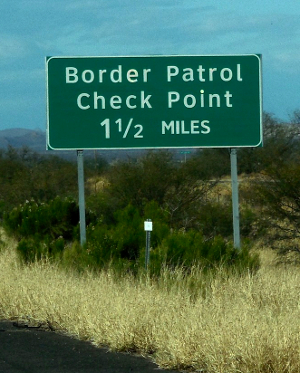 International road trips
can be a fun and inexpensive way to see the world, but there are strict
regulations as to what is allowed in your vehicle when crossing through
a US Customs and Border Protection (CBP) checkpoint. Getting caught
with contraband in your vehicle or on your person will result in, at
minimum, confiscation, or at worst, your arrest.
International road trips
can be a fun and inexpensive way to see the world, but there are strict
regulations as to what is allowed in your vehicle when crossing through
a US Customs and Border Protection (CBP) checkpoint. Getting caught
with contraband in your vehicle or on your person will result in, at
minimum, confiscation, or at worst, your arrest.
All of the items below are identified by the US CBP as prohibited items. Some are forbidden outright, while others are only considered illegal in certain quantities, at specific border crossings, or without proper documentation.
It is worth noting that the following list applies to US border crossings and inspections conducted by US CBP agents. If you are crossing a non-US international border - like if you are road-tripping across Europe - be sure to check with the regulations of both the country you are departing and the one you are entering. Getting into trouble as an American at a US CBP checkpoint is one thing, finding trouble as a foreigner in a foreign land is another.
In addition, remember that you every member of your party will need a valid passport when crossing into or out of the United States (or virtually any other country for that matter). Be sure to check out our guides on obtaining a new passport or renewing a passport to be sure you are properly credentialed to travel internationally in the first place.
Prohibited Items
Cultural Artifacts and Property
Fish, Wildlife, and Hunting Trophies
Living Organisms (Biologicals)
Alcohol
The amount of alcohol you are allowed to bring into the US will depend upon the state you are crossing into. It is up to you to comply with the rules set by the specific border state’s alcoholic beverage control board.
Be advised that certain types of alcohol that purport to have hallucinogenic properties (like Absinthe) are not allowed to enter through US CBP checkpoints under any circumstances.
Counterfeit Items
Items that infringe upon copyright and/or trademarks are not allowed. In most cases, this type of counterfeit material (media, toys, books, clothing, etc.) is subject to confiscation. In certain cases, trying to cross a US border with counterfeit material can result in imprisonment.
There is an exemption offered for single items if it can be proven that they are for personal use and not intended for sale. A copied CD or bootleg T-shirt is unlikely to result in arrest.
Cultural Artifacts and Property
Any stolen art, artifact, or antiquity (whether you are aware of it being stolen or not) will be confiscated under the US National Stolen Property Act. To avoid seizure, these items require valid export documentation.
Defense Articles
Any blueprints, hardware, software, technology, or other regulated defense article may be imported or exported only with appropriate documentation. If your work has any relation to the military or US defense, check your car carefully before you pack to be sure you don’t have any of these prohibited articles or commodities in your vehicle. If you need to bring any items pertaining to US defense across the border, do your due diligence with either your employer, the Directorate of Defense Trade Control's (DDTC), and/or the Bureau of Industry and Security to ensure you have the proper documentation to do so.
Dog and Cat Fur
Products containing dog or cat fur are illegal in the US. If you attempt to bring such an item across the border, it will be seized and you will face a hefty fine.
Drug Paraphernalia
The possession of drug paraphernalia without a prescription is prohibited in the US. If you attempt to bring such an item across the border without proper documentation, it will be seized and you will face a hefty fine and possibly even jail time. If you require these types of items (such as syringes) for a legitimate medical condition, be sure to pack multiple copies of your current prescription.
Firearms
Firearms and munitions can only be imported into the US by an entity licensed by the Bureau of Alcohol, Tobacco, Firearms and Explosives (ATF). If seeking to cross the border with a firearm from the US Munitions List, check with the US Department of State to see if additional licensing is required.
Returning with the same guns or ammunition with that you left the US with is simpler as long as you have registered these items with CBP before departure using Form-4457.
Fish, Wildlife, and Hunting Trophies
Importing or exporting any wild animals (of any kind), animal part or byproduct, or product made from fish or wildlife requires approval and documentation from the US Fish and Wildlife Service (FWS). Failing to procure the proper permits before entering or exiting the US will certainly lead to issues at the border.
Furthermore, there are only certain CBP ports of exit and entry that are equipped to handle said permits. This is because these must be inspected to ensure they are sanitary before entering the country.
Crossing the border with any endangered species or products made from endangered species can be especially problematic. There are exceptions for ivory antiques that are accompanied by documentation proving that they are at least 100 years old. To be safe, be sure to contact the FWS well before attempting to enter or exit the US with any fish and wildlife.
Food
The US Department of Agriculture (USDA) has a special subdivision called the Animal and Plant Health Inspection Service (APHIS) that is the authority on what prepared food products and food ingredients that are permissible to enter the US. Baked goods, packaged goods, and other prepared foods are usually permitted to cross the border without issue. Meat-based products, however, typically are not. Fruits, grains, and vegetables may or may not be permitted depending upon their condition and origin. These regulations are regularly subject to change as global conditions and diseases are constantly in flux. Be sure to check with APHIS for the latest list of prohibited foodstuffs.
It is important to note that any food that is being imported for commercial use must be reported to the US Food and Drug Administration in accordance with the Bioterrorism Preparedness and Response Act of 2002.
Gold
Gold may be brought into the country as long as it complies with the regulations of the Office of Foreign Assets Control (OFAC). Certain types of unmarked gold coins or quantities of gold originating from specifically prohibited nations will be seized by CBP.
Living Organisms (Biologicals)
You may bring in biological specimens (including cultures, viruses, fish, insects, animals, and all other living organisms) as long as they meet the requirements set by the USDA and Center for Disease Control (CDC).
Medication
When bringing medication across the US border, it must meet a very specific set of requirements:
- All drugs and medications should be in their original containers.
- You must have a current prescription for any prescribed medication you are carrying.
- You should only have the amount of medication you would need for personal use during your time abroad.
- Do not attempt to bring narcotics or other drugs that cannot be legally prescribed in the US across the border. They will be confiscated and you could be subject to stiff penalties.
No matter what medication you are traveling with - whether they are prescribed or over-the-counter – be sure to declare it to CBP when you leave and/or enter the US.
Merchandise from Embargoed Countries
You cannot bring merchandise of any kind into the US from a country currently under embargo. These embargos are always subject to change, so check with the Office of Foreign Assets Control (OFAC) for of the current list of embargoed countries.
Pets
Typically, state and local regulations will be more stringent than federal ones when it comes to leaving or entering the country with a pet. A general rule of thumb is to make sure to bring up-to-date vaccination records for any pet you are traveling with across the border. For animals in good health, there should not be any trouble as long as you comply with the most current Pets and Wildlife regulations put forth by the CBP.
Plants and Seeds
Every plant, cutting, or seed entering into the US is subject to CBP inspection. This policy aims to prevent pests and other invasive species from entering into the US ecosystems. This policy also applies to objects made or stuffed with straw.
Just like with animals, endangered plant species are only allowed into the US with proper export permits from the country of origin.
Soil
Bringing foreign soil (defined by the CBP as “loose surface material of the earth in which plants, trees, and scrubs grow.”) into the US is generally not allowed. However, there are instances where import permits are issued. If bringing soil across the border is something you must do, be sure to procure proper documentation first.
Textiles
Bringing back textiles and clothing for personal use is generally no problem. However, bringing larger quantities, specifically if you intend (or it appears you intend) to use the items for commercial purposes, additional duties may be assessed and additional visas may be required.
Vehicles
Importing a vehicle into the US is trickier than just driving across the border. Vehicles from other countries must be documented to meet all federal standards set by the Environmental Protection Agency and the Department of Transportation. These standards require most imported cars to be modified prior to their arrival or in a timely fashion once on US soil. Failing to meet these standards could result in seizure and even the destruction of the vehicle.
Ready to get packing for your international road trip? Don't forget to pack your passport!
⚠️ Current Processing Time Alert: Standard government processing is currently estimated at 4-6 weeks.
If you are traveling within the next 14 days, standard mail-in services may not arrive in time.
Check availability for 24-48 hour private expedited services here »
Essential Travel Resources for Your Next Adventure
- Travel Insurance – Protect your trip with trusted, affordable coverage for medical emergencies, cancellations, and more.
- Flights & Hotels – Find the best deals on flights and accommodations worldwide with Booking.com’s powerful search engine.
- Tours & Local Experiences – Discover unforgettable experiences with top-rated local tours and activities in every destination.
- eSIMs & Phone Plans – Stay connected abroad with affordable eSIM data plans—no physical SIM card required.
- Luggage & Travel Gear from Amazon's Best Sellers – Shop the most popular backpacks, luggage, and travel accessories travelers swear by.
- Rocket Languages Award-Winning Courses – Learn a new language fast with immersive, self-paced courses loved by travelers.
- Registered Passport Courier Services – Need your passport fast? Use trusted expediters to save time and avoid stress.


